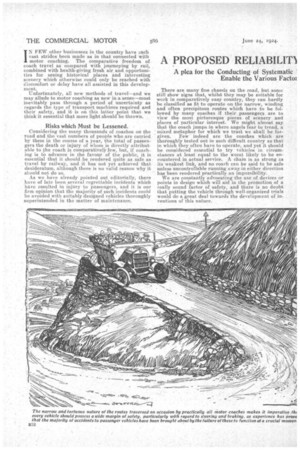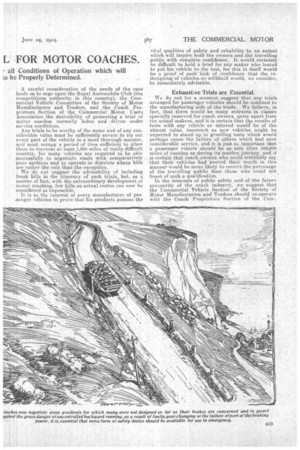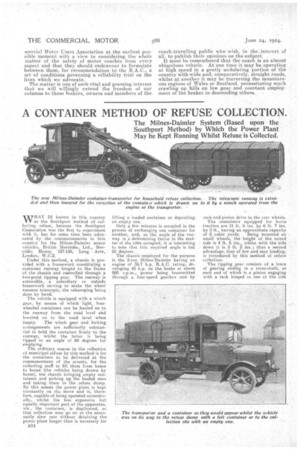A PROPOSED RELIABILITS L FOR MOTOR COACHES.
Page 18

Page 19

Page 20

If you've noticed an error in this article please click here to report it so we can fix it.
A plea for the Conducting of Systematic ' Enable the Various Facto all Conditions of Operation which will to be Properly Determined.
IN FEW other businesses in the country have such vast strides been made as in that connected with motor coaching. The comparative freedom of coach travel as compared with journeying by rail, combined with health-giving fresh air and opportunities for seeing historical places and interesting scenery which otherwise could only be reached with discomfort or delay have all assisted in this development.
Unfortunately, all new methods of travel—and we may allude to motor coaching as new in a sense—must inevitably pass through a period of uncertainty as regards the type of transport machines required and their safety, and it is on this latter point that we think it essential that more light should he thrown.
Risks which Must be Lessened. ,
Considering the many thousands of coaches on the road and the vast numbers of people who are carried by them in the course of a year, the total of passengers the death or injury of whom is directly attributable to the coach is comparatively few, but, if coaching is to advance in the favour of the public, it is essential that it should be rendered quite as safe as travel by railway, and it has not yet achieved that desideratum, although there is no valid reason why it should not do so.
As we have already pointed out editorially, there have of late been several regrettable incidents which 'have resulted in injury to passengers, and it is our firm opinion that the majority of such incidents could be avoided with suitably designed vehicles thoroughly superintended in the matter of maintenance. There are many fine chassis on the road, but some still show signs that, whilst they may be suitable for work in comparatively easy country, they can hardly be classified as fit to operate on the narrow, winding and often precipitous routes which have to be followed by many coaches if their passengers are to view the most picturesque pieces of scenery and places of particular interest. We might almost say that the coach jumps in where angels fear to tread, a mixed metaphor for which we trust we shall be for. given. Few indeed are the coaches which are thoroughly tested out in such difficult country as that in which they often have to operate, and yet it should be considered essential to try vehicles in circumstances at least equal to the worst likely to be encountered in actual service. A chain is as strong as its weakest link, and no coach can be said to be safe unless uncontrollable running away in either direction has been rendered practically an impossibility.
We are constantly advocating the use of devices or points in design which will aid in the promotion of a really sound factor of safety, and there is no doubt that putting the vehicle through well-organized trials would do a great deal towards the development of inventions of this nature. A careful consideration of the needs of the ease leads us to urge upon the Royal Automobile Club (the competitions authority in this country), the Commercial Vehicle Committee of the Society of Motor Manufacturers and Traders, and the Coach Proprietors Section of the Commercial Motor Ifsets Association the desirability of promoting a trial of motor coaches normally laden and driven under service conditions.
Any trials to be worthy of the name and of any considerable value must be sufficiently severe to try out every part of the vehicle in a most thorough manner, and must occupy a period of time sufficient to allow them to traverse at least 1,000 miles of really difficult country, for many vehicles are required to be able successfully to negotiate roads with comparatively poor surfaces and to operate in districts where hills are rather the rule than the exception.
We do not suggest the advisability of including freak hills in the itinerary of such trials, but, as a matter of fact, with the extraordinary development of motor coaching, few hills on actual routes can now be considered as impossible. It is to the interest of every manufacturer of pas.senger vehicles to prove that his products possess the vital qualities of safety and reliability to an extent which will inspire both the owners and the travelling public with complete confidence. It would certainly be difficult to hold a brief for any maker who feared to put his vehicle to the test, for this in itself would be a proof of such lack of confidence that the redesigning of vehicles so withheld would, we consider, be immediately advisable.
Exhaust;ve Trials are Essential.
We do not for a moment suggest that any trials arranged for passenger vehicles should be confined to the manufacturing side of the trade. We believe, in fact, that there would be many entrants in classes specially reserved for coach owners, quite apart from the actual makers, and it is certain that the results of tests with any vehicle GO entered would be of the utmost value, insomuch as new vehicles might be expected to stand up to gruelling tests which would perhaps cause the failure of others which had seen considerable service, and it is just as important that a passenger vehicle should be as safe after 100;000 miles of running as during its maiden journey, and it iS certain that coach owners who could truthfully say that their vehicles had proved their worth in this manner would be more likely to receive the patronage of the travelling public than those who could not boast of such a qualification.
In the interests of public safety and of the future proaoerity of the coach industry, we suggest that the Commercial Vehicle Section of the Society of Motor Manufacturers and Traders should co-operate with the Coach Proprietors Section of the Corn inereial Motor Users Association at the earliest possible moment with a view to considering the whole matter of the safety of -motor coaches from every aspect and that they should endeavour to formulate between them, for recommendation to the R.A.C., set of conditionsgoverning a reliability trial on the lines which we :advocate.
The matter is one of such vital and pressing interest that we will willingly extend the freedom of our columns to those tnakers, owners and members of the
coach-travelling public who wish, in the interest of all, to publish their opinions on the 6ubject.
It must be remembered that the coach is an almost ubiquitous vehicle. At one time it may be operating at high speed in a gently undulating portion of the country with wide and, comparatively, straight roads, whilst at another it may be traversing the mountainous regions of Wales or Scotland, necessitating much craWling up hills on low gear and constant employment of the brakes in descending others.






























